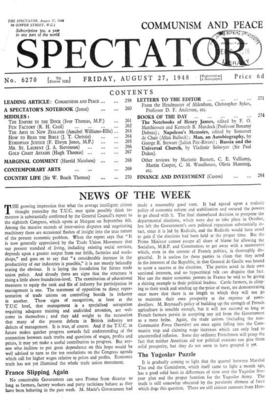NEWS OF THE WEEK
THE growing impression that what the average intelligent citizen thought yesterday the T.U.C. may quite possibly think to- morrow is substantially confirmed by the General Council's report to the eightieth Congress, which opens at Margate on September 6th. Among the massive records of inter-union disputes and negotiating machinery there are occasional flashes of insight into the true nature of the present economic problem. When the report says that " It is now generally appreciated by the Trade Union Movement that our present standard of living, including existing social services, depends upon a greater output from our fields, factories and work- shops," and goes on to say that "a considerable increase in the productivity of our industries is possible," it is not merely belatedly stating the obvious. It is laying the foundation for future trade union policy. And already there are signs that the structure is rising a little above foundation-level. The examination of educational measures to equip the rank and file of industry for participation in management is one. The statement of opposition to direct repre- sentation of trade unions on controlling boards in industry is another. These signs of recognition, at least at the T.U.0 level, that management is a specialised occupation requiring adequate training and undivided attention, are wel- come in themselves ; and they add weight to the accusation that many of the present defects in British industry are defects of management. It is true, of course. And if the T.U.C. in future makes quicker progress towards full understanding of the connection between such truths and questions of wages, profits and prices, it may yet make a useful contribution to progress. But any- one who inclines to put great dependence on this hope would be well advised to turn to the ten resolutions on the Congress agenda which call for higher wages relative to prices and profits. Economic truth has not yet illumined the whole trade union movement.


































